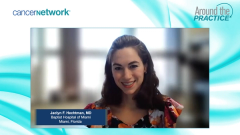
Role of Immunotherapies in Microsatellite Stable Metastatic CRC
Shared insight on the potential role for immunotherapeutic agents in the setting of microsatellite stable metastatic colorectal cancer.
Episodes in this series

Transcript:
Cathy Eng, MD: Kristen, we don’t have a lot of great data regarding immunotherapy in our MSI stable patients, but I thought maybe you could highlight the potential role. There was very nice pilot data that came out from MD Anderson at this year’s ASCO [American Society of Clinical Oncology] from Dr Van Morris. Now, it’s going to be a SWAG, it is, sorry, a SWAG multicenter study. Maybe you can comment on the role of immunotherapy and the presence of BRAF mutation and were there any other trials that you thought was interesting besides NICHE-2 regarding the role of immunotherapy in our MSI stable patient population?
Kristen K. Ciombor, MD: As good as the results have been in the MSI high population utilizing immunotherapy we certainly have not seen the same successes in microsatellite stable population which is most of our patients. That’s one of the biggest challenges we’re facing right now is to try to see, are there subsets or ways that we can make immunotherapy more active in these patients so they can benefit too. As you mentioned, probably one of the most exciting subsets that is being explored is the patients with BRAF (V600E) mutations in microsatellite stable disease, Dr Morris presented at ASCO GI this year, the single institution phase I2 study of encorafenib, cetuximab, and nivolumab in patients with BRAF mutations that were not MSI high with the rationale being that there is some higher immune activation that exists and maybe even higher tumor mutational burden in the patients with BRAF mutations. So, patients who are eligible for this study had one or two prior lines of therapy like BCON but had not received prior anti-EGFR or BRAF inhibitors. Patients got monthly nivolumab in addition to the encorafenib and cetuximab with primary endpoint being response and also looking at safety, tolerability, and whatnot. This was a relatively small study but given the relative rarity of this marker was a great number of patients to look initially at the efficacy here and what we saw was that the response rate with encorafenib, cetuximab and nivolumab was actually 50%, which is higher than we saw, obviously cross trial comparisons aside, higher than in BCON. The disease control right here was almost a 100%, it was about 96%. PFS was about 7 months. Overall survival was about 15 months. Again, not comparing them directly but looking like a very intriguing subset of patients in which, we might be able to utilize this. As you mentioned SWOG 2107 has been activated across the country and that is a randomized study, multicenter study that we are looking forward to enrolling in of encorafenib, cetuximab plus or minus nivolumab, so it’s 2:1 randomization. This will be interesting data to look forward to. And then in addition to other molecular subsets like BRAF, we’re always looking at other hints of activity in the microsatellite stable population where immunotherapy might be more helpful. We are all disappointed by the later line ragonivo and other studies but there were hints of activity and one of the thoughts is that maybe patients without liver mets might benefit more. I think a lot of, you know, ongoing studies are looking at that. At ESMO, [European Society of Medical Oncology] there was an interesting study looking in the first line in patients with either MSS or MSI status who are RAS or RAF or both mutated and those patients got both FOLFOX/FOLFIRI/bevacizumab plus nivolumab. This was a single arm study, so we must keep that in mind and FOLFOX/FOLFIRI/bevacizumab as you know is a very active regimen in the first line but what we saw was that those patients received four months of FOLFOX/FOLFIRI/bevacizumab, nivolumab and then went on to maintenance which was bevacizumab and nivolumab so without cytotoxic chemotherapies. The primary endpoint here was response rate and response rates were very high about 76% and 77% despite whether they were MSS or even in MSS it was good response rate. There were some patients about 14% who are MSI high and again all patients are RAS or RAF mutants, it’s important. Looking at that data it is key because it does combine an active regimen and hopefully the subsequent data from this study and from others will show us how we can potentially utilize immunotherapy in these patients for whom we can’t use it as monotherapy like we can in the MSI high population.
Transcript edited for clarity.
Newsletter
Stay up to date on recent advances in the multidisciplinary approach to cancer.












































